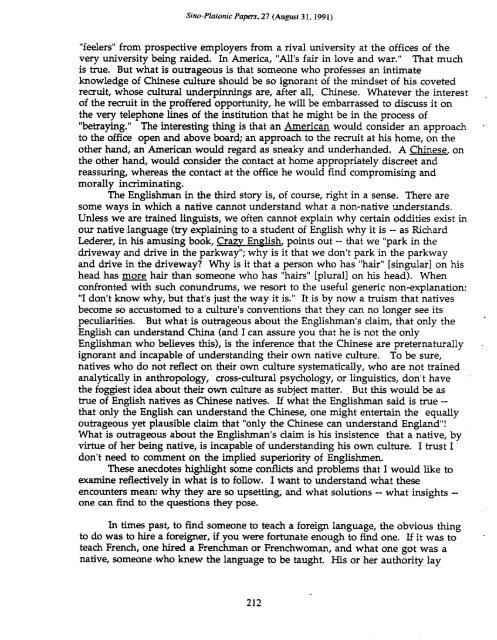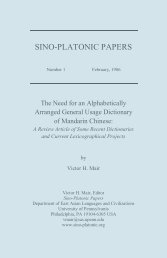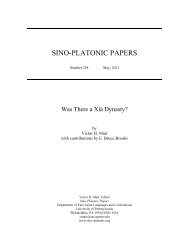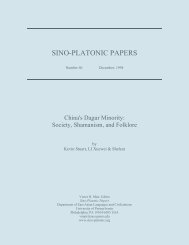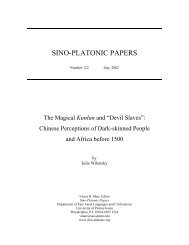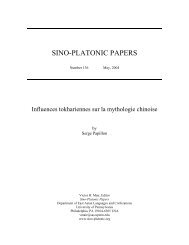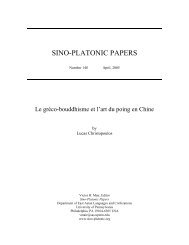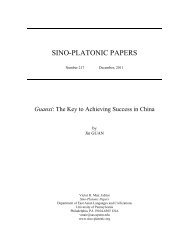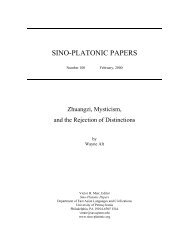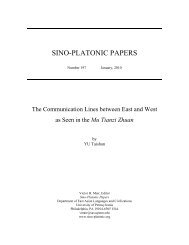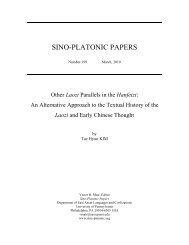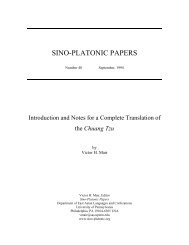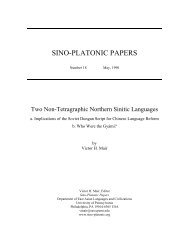Essays on Writing and Language in Honor - Sino-Platonic Papers
Essays on Writing and Language in Honor - Sino-Platonic Papers
Essays on Writing and Language in Honor - Sino-Platonic Papers
Create successful ePaper yourself
Turn your PDF publications into a flip-book with our unique Google optimized e-Paper software.
Sirw-Pkrunic <strong>Papers</strong>, 27 (August 3 1, 199 1)<br />
"feelers" from prospective employers from a rival university at the offices of the<br />
very university be<strong>in</strong>g raided. In America, "All's fair <strong>in</strong> love <strong>and</strong> war." That much<br />
is true. But what is outrageous is that some<strong>on</strong>e who professes an <strong>in</strong>timate<br />
knowledge of Ch<strong>in</strong>ese culture should be so ignorant of the m<strong>in</strong>dset of his coveted<br />
recruit, whose cultural underp<strong>in</strong>n<strong>in</strong>gs are, after all, Ch<strong>in</strong>ese. Whatever the <strong>in</strong>terest ,<br />
of the recruit <strong>in</strong> the proffered opportunity, he will be embarrassed to discuss it <strong>on</strong><br />
the very teleph<strong>on</strong>e l<strong>in</strong>es of the <strong>in</strong>stituti<strong>on</strong> that he might be <strong>in</strong> the process of<br />
"betray<strong>in</strong>g." The <strong>in</strong>terest<strong>in</strong>g th<strong>in</strong>g is that an American would c<strong>on</strong>sider an approach *<br />
to the office open <strong>and</strong> above board; an approach to the recruit at his home, <strong>on</strong> the<br />
other h<strong>and</strong>, an American would regard as sneaky <strong>and</strong> underh<strong>and</strong>ed. A Ch<strong>in</strong>ese, <strong>on</strong><br />
the other h<strong>and</strong>, would c<strong>on</strong>sider the c<strong>on</strong>tact at home appropriately disaeet <strong>and</strong><br />
reassur<strong>in</strong>g, whereas the c<strong>on</strong>tact at the office he would f<strong>in</strong>d compromis<strong>in</strong>g <strong>and</strong><br />
morally <strong>in</strong>crim<strong>in</strong>at<strong>in</strong>g.<br />
The Englishman <strong>in</strong> the third story is, of course, right <strong>in</strong> a sense. There are<br />
some ways <strong>in</strong> which a native cannot underst<strong>and</strong> what a n<strong>on</strong>-native underst<strong>and</strong>s.<br />
Unless we are tra<strong>in</strong>ed l<strong>in</strong>guists, we often cannot expla<strong>in</strong> why certa<strong>in</strong> oddities exist <strong>in</strong><br />
our native language (try expla<strong>in</strong><strong>in</strong>g to a student of English why it is - as Richard<br />
Lederer, <strong>in</strong> his amus<strong>in</strong>g book, Cr English, po<strong>in</strong>ts out -- that we "park <strong>in</strong> the<br />
driveway <strong>and</strong> drive <strong>in</strong> the parkway"; why is it that we d<strong>on</strong>'t park <strong>in</strong> the parkway<br />
<strong>and</strong> drive <strong>in</strong> the driveway? Why is it that a pers<strong>on</strong> who has "hair" [s<strong>in</strong>gular] <strong>on</strong> his<br />
head has more hair than-some<strong>on</strong>e who has 'hairs" [plural] <strong>on</strong> his headj. When<br />
c<strong>on</strong>fr<strong>on</strong>ted with such c<strong>on</strong>undrums, we resort to the useful generic n<strong>on</strong>-explanati<strong>on</strong>:<br />
"I d<strong>on</strong>'t know why, but that's just the way it is." It is by now a truism that natives<br />
become so accustomed to a culture's c<strong>on</strong>venti<strong>on</strong>s that they can no l<strong>on</strong>ger see its<br />
peculiarities. But what is outrageous about the Englishman's claim, that <strong>on</strong>ly the<br />
English can underst<strong>and</strong> Ch<strong>in</strong>a (<strong>and</strong> I can assure you that he is not the <strong>on</strong>ly<br />
Englishman who believes this), is the <strong>in</strong>ference that the Ch<strong>in</strong>ese are preternaturally<br />
ignorant <strong>and</strong> <strong>in</strong>capable of underst<strong>and</strong><strong>in</strong>g their own native culture. To be sure,<br />
natives who do not reflect <strong>on</strong> their own culture systematically, who are not tra<strong>in</strong>ed<br />
analytically <strong>in</strong> anthropology, cross-cultural psyd;ology, or l<strong>in</strong>guistics, d<strong>on</strong>'t have<br />
the foggiest idea about their own culture as subject matter. But this would be as<br />
true of English natives as Ch<strong>in</strong>ese natives. If what the Englishman said is true -<br />
that <strong>on</strong>ly the English can underst<strong>and</strong> the Ch<strong>in</strong>ese, <strong>on</strong>e might enterta<strong>in</strong> the equally<br />
outrageous yet plausible daim that "<strong>on</strong>ly the Ch<strong>in</strong>ese can underst<strong>and</strong> Engl<strong>and</strong>"!<br />
What is outrageous about the Englishman's daim is his <strong>in</strong>sistence that a native, by<br />
virtue of her be<strong>in</strong>g native, is <strong>in</strong>capable of underst<strong>and</strong><strong>in</strong>g his own culture. I trust I<br />
d<strong>on</strong>'t need to comment <strong>on</strong> the implied superiority of Englishmen.<br />
These anecdotes highlight some c<strong>on</strong>flicts <strong>and</strong> problems that I would like to<br />
exam<strong>in</strong>e reflectively <strong>in</strong> what is to follow. I want to underst<strong>and</strong> what these<br />
encounters mean: why they are so upsett<strong>in</strong>g, <strong>and</strong> what soluti<strong>on</strong>s - what <strong>in</strong>sights --<br />
<strong>on</strong>e can f<strong>in</strong>d to the questi<strong>on</strong>s they pose.<br />
In times past, to f<strong>in</strong>d some<strong>on</strong>e to teach a foreign language, the obvious th<strong>in</strong>g<br />
to do was to hire a foreigner, if you were fortunate enough to f<strong>in</strong>d <strong>on</strong>e. If it was to<br />
teach French, <strong>on</strong>e hired a Frenchman or Frenchwoman, <strong>and</strong> what <strong>on</strong>e got was a<br />
native, some<strong>on</strong>e #who knew the language to be taught. His or her authority lay<br />
-


